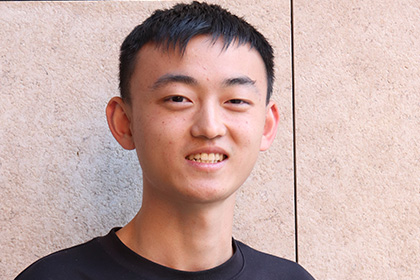“Eynesbury is like a big family. We did a lot of group assignments that improved our teamwork skills ”
Max, China
Diploma of Engineering

8 or 12 months
February, June, October
Coglin Street Campus
Embark on your engineering journey with the Diploma of Engineering at Eynesbury College, designed to provide a direct pathway into Adelaide University, launching in 2026. By completing this diploma, you will gain guaranteed entry into the first or second year of a variety of bachelor’s degrees in Engineering at Adelaide University, depending on your chosen specialisation.
Our Diploma of Engineering curriculum is designed to equip you with the essential skills, knowledge, and confidence to excel in your university studies and future engineering career. The program focuses on core modules equivalent to the first-year content of an engineering degree at university. These modules provide a strong academic foundation, ensuring a seamless transition into the second year of your chosen bachelor’s program. With small class sizes and personalised support, you’ll have the opportunity to thrive in a dynamic learning environment tailored to your success.
To join the Diploma of Engineering program, you’ll need to meet the following criteria:
Not sure if you meet the requirements? Contact our admissions team for guidance or explore alternative entry pathways. View all entry requirements
The free Language Development Module (LDM100) enables international students to continue to develop their English language skills, while engaging with their studies. Building strong English language skills gives students the best chance of success in their studies and future career.
While compulsory for some students, LDM100 does not count towards credit points and is free of charge. Eligibility criteria and exemptions of this module are provided during enrolment.
Enter the below Engineering specialisations at Adelaide University with a full year of credit from your Eynesbury Diploma of Engineering.
| Progression requirement | Degree | Courses credited (max. 8) | Remaining duration (years) |
|---|---|---|---|
| SC | Bachelor of Engineering (Civil) (Honours) * | 8 | 3 |
| SC | Bachelor of Engineering (Chemical) (Honours)* | 8 | 3 |
| SC | Bachelor of Engineering (Electrical and Electronic) (Honours) * | 8 | 3 |
| SC | Bachelor of Engineering (Mechanical) (Honours) * | 8 | 3 |
SC = Successful completion
*Prerequisite: SACE Stage 2 Mathematical Methods (or equivalent).
Last updated February 2025
Get a head start with your Eynesbury Diploma of Engineering and gain direct entry into Bachelor’s degrees at Adelaide University.
SC = Successful completion
*Prerequisite: SACE Stage 2 Mathematical Methods (or equivalent).
Last updated February 2025
Students study 8 core modules.
This module develops a basic understanding of the fundamentals and principles of analog and digital circuits and electronic devices. This understanding is a critical step towards being able to design new electronic circuits or use them appropriately as part of a larger engineering system. The module is designed to be a broad introduction to electronic systems for students from diverse engineering disciplines.
This module teaches students how to apply Newtonian physics to analyse relatively simple physical mechanisms with some emphasis on commonly encountered engineering applications. It follows on from the Engineering Mechanics – Statics module, but considers systems that are not in equilibrium i.e. with velocity and acceleration. Some of the topics covered are pure kinematics (a mathematical description of motion only), while others are kinetic.
This module familiarises students with the principles of static equilibrium by applying Newton’s laws of motion to solve engineering problems. Emphasis is placed on drawing free body diagrams and self checking strategies. Topics include introduction to forces; 2D equilibrium of particles and rigid bodies; centre of gravity and centroids; distributed loading and hydrostatics; friction; analysis of truss structures; and shear force and bending moment diagrams.
This module provides development of the critical thinking skills necessary to analyse and evaluate academic texts, and the language skills to prepare and present findings. Class work and assignments are designed to develop students? communication skills appropriate to the study of engineering and do so through the use of materials that focus on issues related to engineering professional practice. Tasks relate to research and the preparation of evidence-based papers appropriate to academic and professional settings, as well as informal academic group discussion and formal seminar presentation.
This module explores the central role of infrastructure in society, both locally and globally. It examines the different elements of infrastructure and incorporates links with industry and real life experience from technical, social, environmental, economic and sustainability perspectives. Students work in small groups to create civil engineering analyses, designs and drawings. The group work will develop the key engineering attributes of working together in a team and professional communication skills.
Topics include: Calculus: functions of one variable, differentiation, the definite integral, and techniques of integration. Algebra: Linear equations, matrices, the real vector space determinants, optimisation, applications of linear algebra.
Topics include: Calculus: Differential equations, sequences and series, power series, calculus in two variables. Algebra: Subspaces, rank theorem, linear transformations, orthogonality, eigenvalues and eigenvectors, singular value decomposition, applications of linear algebra.
All modern engineering projects use programming for data analysis and problem solving. This module introduces the fundamental concepts of procedural programming using the MATLAB programming environment. This module also includes C, which introduces low-level programming concepts, and Excel, which consists of data analysis and algorithm development using industry-standard spreadsheet approaches.
Classes:
Classes run between 9am and 5.30pm on weekdays (Adelaide time zone, ACST). You can expect between 4-6 hours of private study per module, per week.
Mode of Study:
Programs are delivered through a variety of modes, not excluding online studies

Max, China
Diploma of Engineering
Ready to apply for this Diploma program? Follow the application process for Eynesbury College
How to ApplyGet in touch with one of our representatives for more details about this course and other offerings at Eynesbury College.
Find a representatives